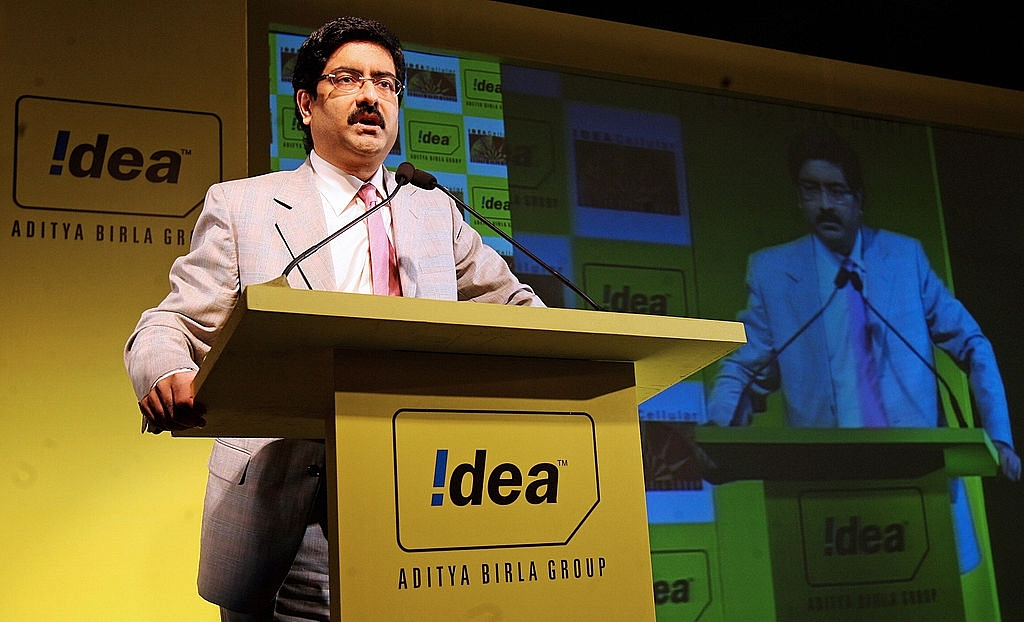Business
Vodafone-Idea Merger: Why It Makes No Sense For The Birlas To Seek Parity
- The whole point of a merger is that both companies save on capital and other costs. If the Birlas seek parity in the merger, they can bid farewell to any possible savings.

Kumaramangalam Birla (PAL PILLAI/AFP/Getty Images)
The ongoing talks between Vodafone and Idea Cellular, India’s No 2 and No 3 telecom majors with 203 million and 188 million customers respectively as at the end of November 2016, will (if consummated with a merger) hasten the pace of consolidation in the industry. However, one obsession may come in the way of a sensible deal: the need of the Aditya Birla Group, 42 percent owners of Idea, to maintain parity with Vodafone in the merged entity.
When a 100 percent Vodafone-owned Indian entity merges with a 42 percent Birla-owned venture in an all-share deal, the result will be Vodafone domination of the shareholding. To maintain parity, the Birlas will have to pump over Rs 25,000 crore into Idea before the merger or after, says an Economic Times report. Alternately, Vodafone would have to cut its stake before the merger.
This makes no sense to either party or for the future of the merged entity. Indian promoters need to get out of the need to control their ventures, and an attempt to hold parity with the other promoter post-merger is doomed to fail. No 50-50 partnership deal has survived in India for long, for this kind of shared ownership always leads to conflicts of interest.
Even otherwise, there is no logic in the Birlas trying to inject Rs 25,000 crore into Idea when the whole point of merging the companies is to consolidate and optimise on capital investment and assets, including spectrum. If the Birlas inject more capital, they might as well keep Idea as it is, for Idea then would have enough resources to grow on its own or acquire smaller telecom companies. If Vodafone has to cut its stake by diluting its holdings in its Indian outfit, the new capital will come from third parties, which means Vodafone will be even more strongly capitalised to carry on as a standalone entity, or have enough resources to buy out smaller players.
The whole point of a merger is that both companies save on capital and other costs, so that future investments go towards strengthening the quality of service and building a stronger customer franchise.
There is no way Kumar Birla can generate adequate returns on Rs 25,000 crore of ownership capital in Vodafone-Idea. He would earn more by merely keeping the cash in a fixed deposit or investing in 100 startups, a few of which could spawn billion-dollar businesses. In the age of disruption, it is foolish to invest so much for so little in one venture with no guarantee of eternal success. Majority-ownership is a mugs’ game in capital-hungry industries.
Capital is one of the costliest resources to service, and the reason why Indian promoters have had to resort to underhand measures to retain majority ownership in their companies is that they do not have enough private wealth of their own to invest in them. Like the Birlas, the Tatas too could be wise to let go of Tata Teleservices, which has no hope in hell of becoming a major player without large investments, even more than what the Birlas need to retain an equal stake in Vodafone-Idea. Tata Tele has barely 55 million customers, and many of them are deserting. In November, Tata Tele lost over one million customers.
Birla’s interests would be much better served by merging Idea as it is, taking a smaller interest in the merged entity, and entering a shareholder agreement with Vodafone to protect their own long-term interests in the company.
If the Birlas still want to run a telecom company on their own, nothing stops them from leasing spectrum and infrastructure and running a virtual mobile telephony services company.
The moral: If a merger does not bring synergies and cost reductions for both parties, it is not worth attempting.
Introducing ElectionsHQ + 50 Ground Reports Project
The 2024 elections might seem easy to guess, but there are some important questions that shouldn't be missed.
Do freebies still sway voters? Do people prioritise infrastructure when voting? How will Punjab vote?
The answers to these questions provide great insights into where we, as a country, are headed in the years to come.
Swarajya is starting a project with an aim to do 50 solid ground stories and a smart commentary service on WhatsApp, a one-of-a-kind. We'd love your support during this election season.
Click below to contribute.
Latest